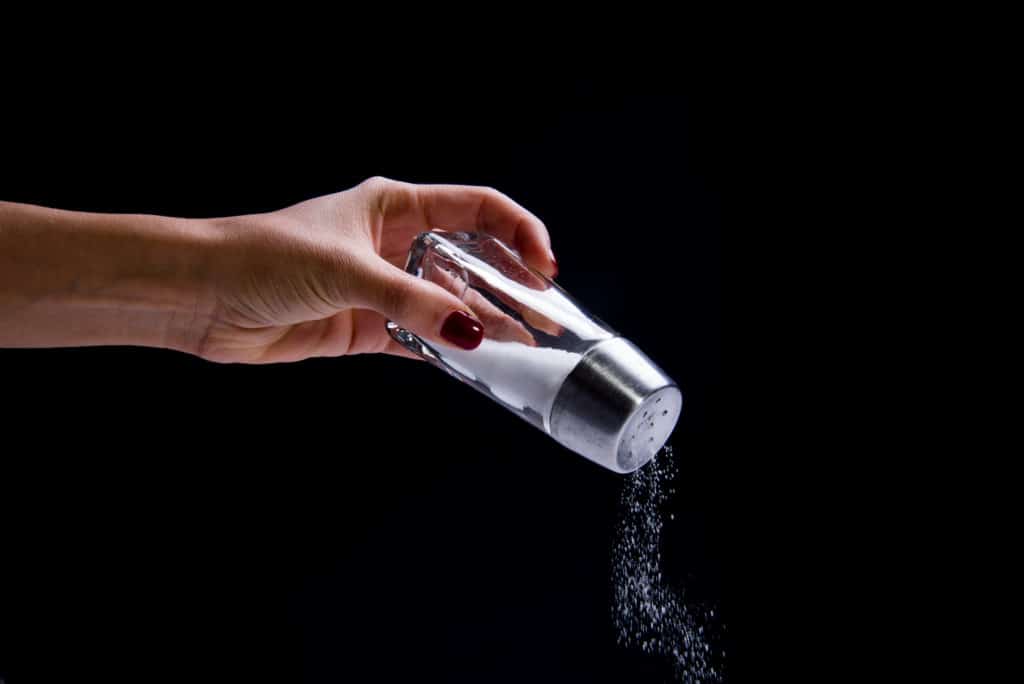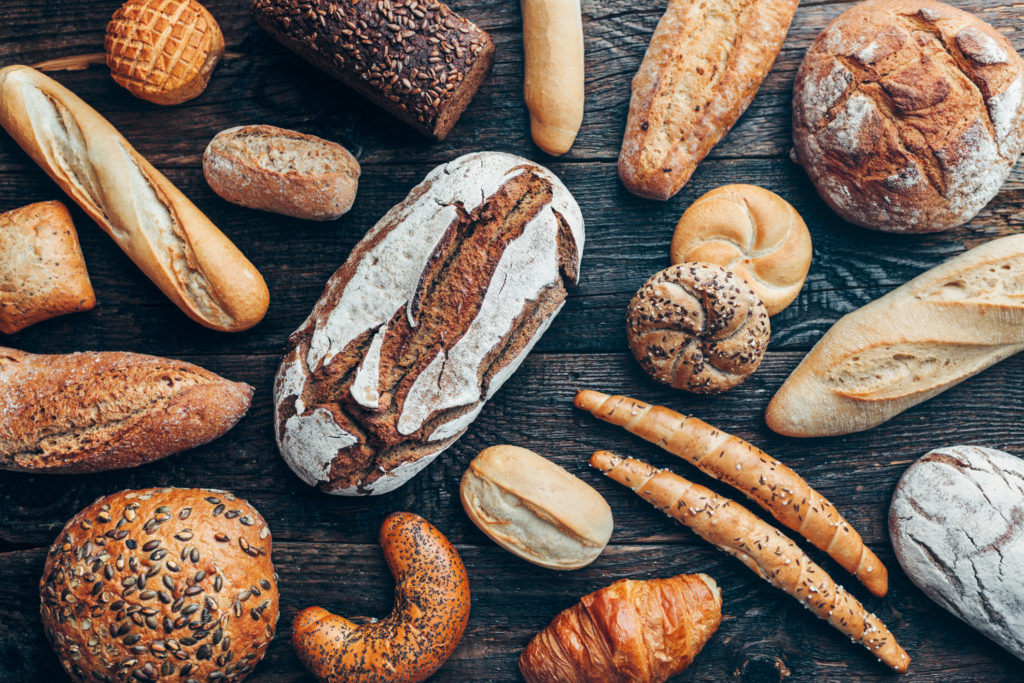Table of Contents
- Is oatmeal good for kidneys?
- Is oatmeal high in potassium?
- Is oatmeal high in phosphorus?
- Is oatmeal good for diabetes?
- How should I prepare oatmeal?
- What is the best flavored instant oatmeal for kidney disease?
- Kidney Friendly Oatmeal You Can Buy
- Are quaker oats good for kidneys?
Is oatmeal good for kidneys?
Yes! Oatmeal can be very kidney friendly. Oatmeal is a whole grain that is high in fiber and low in sodium. The unflavored kinds (i.e. the kinds that do not come in little single serving packets) are also free of phosphorus additives. Like most grains, oatmeal is high in carbohydrates and low in fat, so eating it on it’s own is probably not going to be as filling and satisfying all by itself.
This post may contain affiliate links through which we may earn a small commission to help keep this website free.
If you have kidney disease and are not on dialysis you’ll want to pair oatmeal with some low protein, high fat foods such nuts to add more calories to your meal without going over your protein.
If you’re on dialysis, then adding higher protein foods to go with your oatmeal would be better. Mixing in peanut butter or serving with yogurt or eggs, along with your favorite fruit are all good options for a well rounded, dialysis-friendly breakfast.
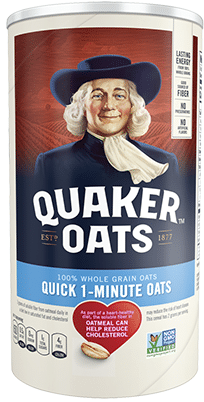
- Calories: 150
- Protein: 5g
- Carbohydrate: 27g
- Fat: 3g
- Sodium: 0mg
- Phosphorus
Additives: None - Potassium: 150mg
- Calcium: 20mg
- Fiber: 4g
- Sugar: 1g
Is oatmeal high in potassium?
No. A half cup of dry instant oatmeal contains 150 calories and 150mg of potassium. Generally speaking, when a food has roughly the same amount of potassium as calories, it is considered a low potassium food.
Many people with CKD who are not on dialysis do not need to be on a potassium restriction and there are many other things that could be causing your potassium levels to be high. For example, constipation can impact your potassium levels. Foods high in fiber, such as oatmeal, can help prevent constipation.
Research even suggests that consuming oatmeal may have a beneficial impact on albumin and potassium levels in people with chronic kidney disease.
Other types of oatmeal that are unflavored such as steel cut oats or rolled oats will have similar nutrition, so rolled oats, quick oats, and steel cut oats are all considered low potassium foods.
Is oatmeal high in phosphorus?
No. One half cup of dry rolled oats contains an estimated 50mg of bioavailable phosphorus making it a low phosphorus food.
There are many websites (even some reputable ones!) that still list oatmeal as being a high phosphorus food, but this is based on outdated information. A serving of oats may contain 166mg of total phosphorus, however we now know that phosphorus found in plant-based foods such as oatmeal is very poorly absorbed by the body.
It is estimated that only about 30% of plant-based phosphorus can be absorbed by your body, which means that only 30% of that phosphorus will enter your bloodstream and potentially cause high phosphorus levels. Just be careful of flavored oatmeals and phosphorus additives.
Many store bought flavored oatmeal packs contain phosphorus additives, which are not good for people with kidney disease. This type of phosphorus is very well absorbed by your body and is one of the biggest contributors to high phosphorus levels for people with kidney disease.
In order to ensure that you are buying a low phosphorus oatmeal, be sure to check the ingredient list for any words that contain the letters ‘PHOS’. If you see ‘PHOS’ in any ingredient on the oatmeal label, it would be best to find a different option (we share plenty below!).
Is oatmeal good for diabetes?
Oatmeal is a high carbohydrate food, however that does not mean that people with diabetes cannot enjoy it. Oatmeal is considered a complex carbohydrate and it is high in fiber, so this helps slow down digestion and prevent large spikes in blood sugar.
We recommend limiting your portion to one serving, and to be sure that you are including lots of healthy fats with your meal to help maintain more even blood sugar and to make the meal more filling. Pair it with a high fiber fruit like berries and your favorite high fat nuts.
We also recommend preparing oatmeal from scratch. Many pre-flavored oatmeals are high in added sugars and may also contain phosphorus additives or excess sodium.
How should I prepare oatmeal?
Cooking your oatmeal from scratch is actually quite easy (especially if you choose the quick cooking oats). Check out our easy recipe for kidney friendly Apple Cinnamon Oatmeal. When cooking oatmeal, we recommend using water or a plant based milk since they are lower in protein. Experiment with different mix-ins like cinnamon, maple syrup, apples, strawberries, flaxseed, etc.
What is the best flavored instant oatmeal for kidney disease?
If you don’t want to cook your own oatmeal and prefer to buy pre-flavored, there are a few things to keep in mind:
- Sodium – many pre-packaged, flavored instant oatmeals are high in sodium. Certain flavors like Maple and Brown Sugar tend to be repeat offenders and most brands with that flavor will be too high. Be sure to check the food label to make sure that the one you select has more calories that sodium.
- Phosphorus additives – many instant oatmeal packets contain phosphorus additives, which makes them a high phosphorus food. Be sure to read the ingredient labels to make sure that the oatmeal you have selected does not contain phosphorus additives.
- Protein – many instant oatmeals now contain added protein. If you have CKD and are not on dialysis, you should be limiting your protein intake. You will want to avoid any higher protein oatmeals. In general, instant oatmeal should have no more than 4g of protein per packet.
Keep reading to see which flavored oatmeals are considered kidney-friendly!

Kidney Friendly Oatmeal You Can Buy
365 by Whole Foods Apple Cinnamon Instant Oatmeal
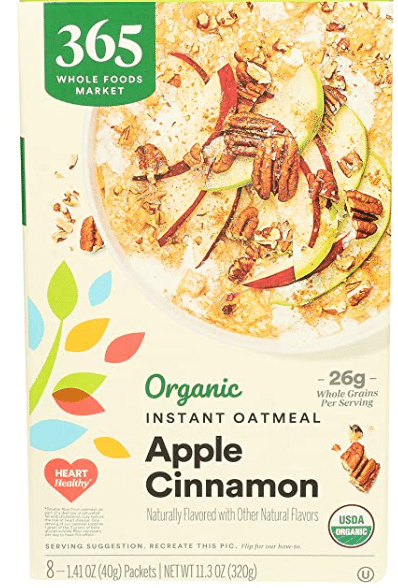
- Calories: 150
- Protein: 3g
- Carbohydrate: 31g
- Fat: 1.5g
- Sodium: 45mg
- Phosphorus
Additives: None - Potassium: 120mg
- Calcium: 0mg
- Fiber: 3g
- Sugar: 13g
Bakery on Main Instant Oatmeal
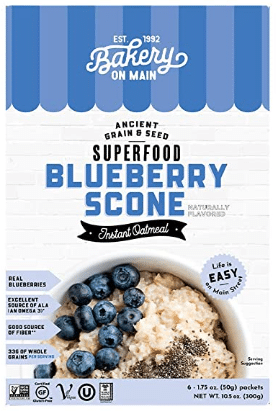
- Calories: 200
- Protein: 7g
- Carbohydrate: 36g
- Fat: 3.5g
- Sodium: 40mg
- Phosphorus
Additives: None - Potassium: 190mg
- Calcium: 30mg
- Fiber: 5g
- Sugar: 11g
Good & Gather Apple Cinnamon Instant Oatmeal
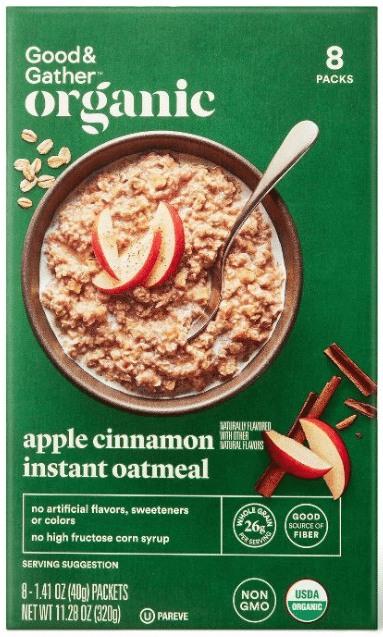
- Calories: 150
- Protein: 4g
- Carbohydrate: 31g
- Fat: 2g
- Sodium: 70mg
- Phosphorus
Additives: None - Potassium: 130mg
- Calcium: 0mg
- Fiber: 3g
- Sugar: 12g
Publix Greenwise Maple & Brown Sugar
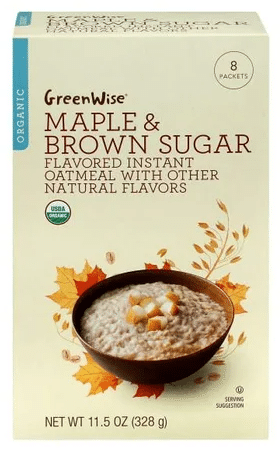
- Calories: 150
- Protein: 4g
- Carbohydrate: 32g
- Fat: 2g
- Sodium: 95mg
- Phosphorus
Additives: None - Potassium: 110mg
- Calcium: 0mg
- Fiber: 3g
- Sugar: 12g
Quaker Instant Oatmeal
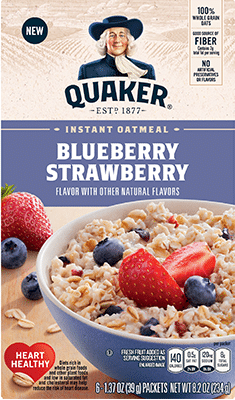
- Calories: 140
- Protein: 4g
- Carbohydrate: 29g
- Fat: 2g
- Sodium: 120mg
- Phosphorus
Additives: None - Potassium: 130mg
- Calcium: 20mg
- Fiber: 3g
- Sugar: 8g
Are quaker oats good for kidneys?
Yes, the unflavored Quaker oats that come in the large container (not the individual packets) are good for people with kidney disease. The unflavored oats will be high in fiber, low in sodium, low in potassium, and low in bioavailable phosphorus.
The flavored products may have added sodium and phosphorus, so always check the food label and ingredient list.

- Calories: 150
- Protein: 5g
- Carbohydrate: 27g
- Fat: 3g
- Sodium: 0mg
- Phosphorus
Additives: None - Potassium: 150mg
- Calcium: 20mg
- Fiber: 4g
- Sugar: 1g



